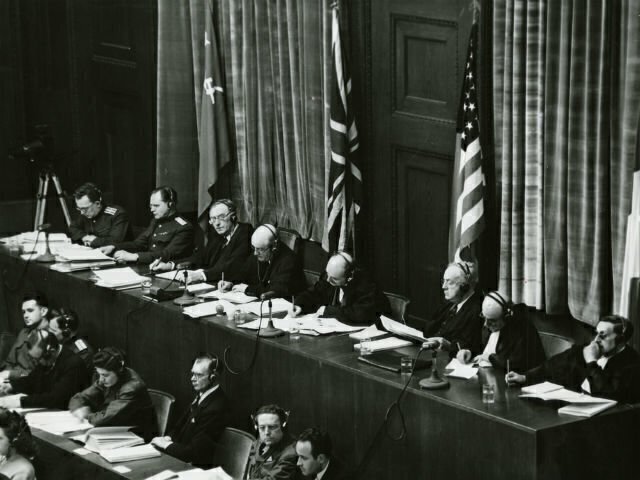

Image: Proceeding of the Nuremberg Trial with the flags of the Allies in the background (UK, US, Soviet Union, France)
The Nuremberg Trials were a year-long set of trials held in Nuremberg Germany after World War 2. For the trials, the allied powers of the United States, Great Britain, France, and the Soviet Union formed an International Military Tribunal (“IMT”). Subject to the trial were 24 of the leaders from Nazi Germany who had been captured alive. They stood trial for crimes against peace, war crimes, crimes against humanity, and conspiracy to commit any of these crimes. (Note: There was a separate International Military Tribunal For The Far East established to prosecute the crimes of Imperial Japan)¹
The Military Tribunal is often considered the start of international criminal law which ultimately influenced and shaped modern international criminal law. The aftermath of the IMT is culminated in the “Nuremberg principles” which inspired many establishments with different safeguards to guarantee that crimes like the ones committed during World War II would never happen again and hold culpable parties liable if they committed these actions. The United Nations Genocide Convention (1948) (“the Convention”) and Universal Declaration of Human Rights (1948) (“UNHR”) were ratified after the Nuremberg Trials. Additionally, the UNHR was established in the same year as the United Nations Genocide Convention and was proclaimed by the United Nations General Assembly in Paris in 1948. Furthermore, the Nuremberg Trials influenced the creation of the Geneva Convention (1949) which was expanded to protect non-combat civilians, the protection of male and female prisoners of war, provisions regarding torture, mistreatment, and discrimination, corresponding with families of prisoners of war.²
The Nuremberg Trials also introduced the concepts of “Crimes against Peace” and “Crimes against Humanity” and were the first effort to distinguish the doctrines of jus in bello (concerning acts in war) and jus ad bellum (concerning the legality of war). The Nuremberg Trials provided a valuable precedent for following international military tribunals like the trials for war crimes committed in the former Yugoslavia (1993) and in Rwanda (1994). The establishment of the International Criminal Court (ICC) in 2002 can at least partly be attributed to the legacy of the Nuremberg trials.³
¹ U.S. Dep't of State, Office of the Historian, The Nuremberg Trial and the Tokyo War Crimes Trials (1945–1948) https://history.state.gov/milestones/1945-1952/nuremberg
² Nürnberg trials, Britannica, https://www.britannica.com/event/Nurnberg-trials (last visited Feb. 27, 2024)
³ Kira Knobloch, The Nuremberg Trials and How They Influenced International Criminal Law, Juris Magazine: Juris Blog (Nov. 6, 2023), https://sites.law.duq.edu/juris/2023/11/06/the-nuremberg-trials-and-how-they-influenced-international-criminal-law/